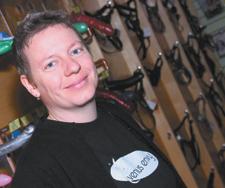
Shelley Taylor in 2006 at Venus Envy. Credit: Pat Croteau

Staff at Venus Envy in 2008. Credit: Paul Galipeau
Every business can profit from a catchy name. Shelley Taylor was right on the money when she came up with the clever play on the stage in Freud’s theory of psychosexual development when a girl realizes with some chagrin that she doesn’t have a penis.
Thanks to Taylor and other trailblazers, now we all know that a woman can have her penis — and beat it, too.
Venus Envy Ottawa turns 10 this year. Xtra chatted with Taylor about her decade of bringing sex-positive vibes to the nation’s capital.
* * *
Xtra: The lefty sex shop seems like it would be a hub of social drama — it’s kind of the beauty parlour of today.
Shelley Taylor: There are a few things that make me really happy about spending my days at Venus Envy: the lesbian couples who hold hands and canoodle in the store, in a way you know they wouldn’t at Chapters or The Bay.
Another is talking to men who can no longer get an erection, or a reliable one, and helping them find ways to have sex with their partners. Working in a place where people trust you with their secrets and their fears is pretty amazing. It’s also so inspiring to meet couples who’ve been together forever and see that they still have that zing and an interest in trying new things with each other. That makes me really happy.
Xtra: Being involved in a store like this forces you, for better or worse, into social activism. How have you managed to balance your role as a businessperson with that of an activist?
ST: There are a lot of benefits that come with owning a business. I can choose to offer the people I work with a decent work environment, health benefits and so on, and I can also choose to donate money and space to activist organizations and others who are working to benefit the community. It also means I can work towards growing the VE bursary fund, something that gives me great pleasure, even if it is very small at this point.
Xtra: The niche market of women- and trans-friendly sex shops, in terms of a business model, is a really interesting one in that it is a market that was not manufactured (say, for example, like the diet industry) but truly needed filling. Can you speak to the experience you’ve had as someone involved in this?
ST: I think a lot of businesses open to fulfill a need or desire rather than being manufactured, especially small businesses. It was the first question I asked myself when thinking about what kind of business to open back in 1997: what does Halifax need or what could the city really use that’s not out there right now? It’s pretty exciting knowing that we’re offering people the option of shopping in a place that actually cares about their health and happiness.
It surprises me that there’s not more of these places opening up across the country. Maybe because it’s easier to make money running a traditional sex shop, where you don’t spend much money on staffing, rent, display and education, so this concept doesn’t appeal to most people wanting to open a sex shop.
Xtra: Have your own philosophies around sexuality changed as you grow with your business? How have you changed in the decade you’ve run Venus Envy in Ottawa?
ST: Considering my politics were, shall we say, unformed when I opened in 1998 in Halifax, I would have to say things have changed a tremendous amount for me.
I wasn’t exactly a sexpert when I opened the first store; it’s something I learned a lot about along the way. I was just really open to talking about sex and really interested in sex and relationships. So the first time an older guy came in looking for a harness for his wife to wear, I was actually kind of surprised. The whole Bend Over Boyfriend thing was still a few years away, and people just didn’t talk about fucking their husbands in the ass, even if they were doing it.
It sometimes shocks me to think about how much has changed in the way we view various sexual practices in the mainstream in the past 13 years. But some things have remained the same for me. The belief that everyone has the right to take pleasure in their own bodies, that restricting sexual practices (alone or between consenting adults) is futile and harmful and that people actually get more open sexually as they get older, when most younger people seem to think it’s the other way around.
Xtra: Describe some differences in the general sexual climate over the past 10 years.
ST: I live in this awesome sex-positive bubble and don’t really interact a whole lot outside of it. But from what I can tell, people seem to think that what we do is normal now. I used to get a lot of giggling and titillation when I told people what I do. Now everyone knows someone who works in a sex shop or who runs some kind of online sex store.
Xtra: I’m curious about the fact that sexuality is often dictated by trends rather than individualist need. What do you think it is about sex that makes people jump on bandwagons with such enthusiasm?
ST: I think most products and interests follow trends, so it makes sense that sex is the same. Also, when it comes to sex, people still feel like weirdos for liking what they like, so if everyone is buying a We-Vibe and it’s in the mainstream newspaper, then it gives them permission to get this toy. Because the fact that it’s everywhere makes it less dirty or more wholesome or something. I suppose that because there’s a lot of shame wrapped up in our desires, when we see or hear of others interested in the same thing, we’re allowed to relax and enjoy rather than staying stuck in our embarrassment and shame.

 Why you can trust Xtra
Why you can trust Xtra


